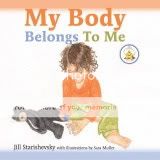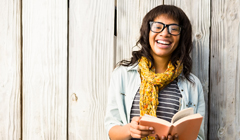- Jill Starishevsky
- 10 Reasons Not to Discuss Child Sexual Abuse in 2012

I have heard them all. I have heard all the reasons why parents don’t discuss child sexual abuse prevention with their children. I have heard them so often that I can recite them by heart. As the new year approaches, I decided it would be a good idea to memorialize the top 10 reasons for not discussing the subject. I invite you to add any that may have been omitted.
- Children are seldom victims of sexual abuse. Actually, according to the U.S. Centers for Disease Control, in the United States, 1 in 4 girls and 1 in 6 boys is sexually abused by the time they are 18. Consider those numbers for a moment. They are shocking and devastating. Those figures alone should motivate parents to seek out prevention strategies.
- This kind of thing doesn’t happen where we live. Actually, child sexual abuse has no socio-economic boundaries. It doesn’t care if you are black or white, rich or poor or what religion you practice. It can creep in when you least expect it.
- We don’t let our children go near strangers. Actually, 93% of all child sexual abuse occurs at the hands of someone known to the child and trusted by the parents. Even if a child is never around strangers, he or she could be victimized by a neighbor, a coach, a religious official or family member. Parents who teach only stranger danger are doing a disservice to their child.
- My child is not old enough for this discussion. Actually, the appropriate age to discuss child sexual abuse prevention is when a child is three years old. The conversation can start as simply as “Did you know that the parts of your body covered by a bathing suit are private and are for no one else to see or touch?” Continue the conversation by explaining to the child that he should tell Mommy, Daddy or a teacher if someone touches him on those private parts. Be sure to include any necessary exceptions for potty training, hygiene and doctor visits.
- I don’t want to scare my child. Actually, when handled properly, children find the message empowering and are not frightened at all. Parents do not refrain from teaching traffic safety for fear that their child will be afraid to cross the street. So too should we address the subject of body safety.
- I would know if something happened to my child. Actually, child sexual abuse is difficult to detect because frequently there are no physical signs of abuse. The emotional and behavioral signs that may accompany sexual abuse can be caused by a variety of triggers.
- My child would tell me if something happened to him. Actually, most children do not immediately disclose when they have been sexually abused. Contrary to a child who falls down and runs over to tell his parents, a child who has been sexually abused is likely being told not to tell anyone because no one will believe him, that people will say it is his fault, that the disclosure will cause great sadness in the family and that the behavior is their little secret.
- We never leave our child alone with adults. Actually, children can be sexually abused by other children. The very same lessons that can help prevent children from being sexually abused by adults, can keep them safe from other children. Teach children what touch is appropriate and what is inappropriate, teach them the proper terminology for their private parts and teach them who they can talk to if anyone touches them in a way that makes them feel uncomfortable.
- I don’t want to put thoughts in her head. Actually, there is no data to indicate that a child who has been taught about child sexual abuse prevention is more likely to fabricate that they have been sexually abused. According to Victor Vieth, director of the National Child Protection Training Center at Winona State University, “Children do lie, but seldom about being abused. All human beings can and do lie, but it's hard for kids to do it about sex. They can't lie about something they have no knowledge of," he said, “and children don't learn about oral sex on Sesame Street."
- It’s not going to happen to my child. Actually, as the statistics reveal, child sexual abuse is so pervasive that it could happen to any child. This reason is the catch-all. Educated, loving parents have actually said this to me. If one were to ask any parent whose child has been sexually abused if they thought their child would ever be sexually abused, I can guarantee each one would say no. No one wants to believe this could happen to their child. We need to stop denying that it could happen and recognize that there are ways to prevent it from happening. Make the decision to talk to your child about sexual abuse prevention in 2012. It could be the greatest gift you ever give them. Have a safe and healthy New Year.
Bio: Jill Starishevsky is an Assistant District Attorney in New York City, where she has prosecuted hundreds of sex offenders and dedicated her career to seeking justice for victims of child abuse and sex crimes. Outside the courtroom, Jill’s fondness for writing led her to create The Poem Lady, where she pens personalized pieces. Her mission to protect children, along with her penchant for poetry, inspired My Body Belongs to Me, a children's book intended to prevent child sexual abuse by teaching 3-8 year-olds their bodies are private. A mother of three, Jill is also founder of HowsMyNanny.com, a service that enables parents to purchase a license plate for their child’s stroller so the public can report positive or negative nanny observations. |
Writing Status Badges












Writing Status Badges












Featured Members (7)
Writing Status Badges











































Jill,
I would suggest that the Title be: Don't Miss Any of the Ten Red Flags About Child Abuse. CONFRONT!
Best wishes, and I agree totally with your essay.
Thanks Jill, for welcoming me to She Writes. I really haven’t had the chance to peruse SW website. But I do look forward to chatting with you and the other group members.
I would add the most selfish reason of all (that I've heard from parents): It's too much, too hard for me.
This is such a good thing to write about, and I think you got most of the major objections to talking about Child Sex Abuse that I hear. I recently had a censorship issue as I tried to submit something in an anthology. The guides were that the submission had to be acceptable for a young adult audience, although that's not the market it will specifically be targeted for. I wrote a story that concerns child sex abuse. And people said "isn't that too adult?" I was told this is an absolutely forbidden topic in the YA market. Personally, I think the YA audience is a GREAT group of people to talk about CSA with.
Thanks for sharing this. I actually remember my family discussing this issue with me when I was young, but I came from a "blame the victim" type of culture. Luckily, I never experienced sexual abuse as a child, but did experience physical abuse from my mom's husband until I was 8. I was also raped as an adult, which I recently discussed on my blog during Crime Victims' Rights Awareness Week. I think one of the most important things you can tell a child is that if something like this happens it's not their fault. I remember my step-dad grabbing me once and hurting me because I was trying to protect my sister. My grandma saw it and told me that a well-behaved little girl wouldn't put herself in that situation. I dealt with a lot of shame growing up thinking that I somehow nagged on the physical abuse, and this was also an issue after I was raped. As a result, it took me nearly seven years to open up about it.
Hi Jill, I love what you are doing here and giving a voice to children who otherwise wouldnt have one. As a survivor myself, I only wished that someone spoke up for me and helped me...and yes, it can happen to anyone...no class, race, socio-economic barriers whatsoever. I for one, talk to my children and have no qualms about letting them know that their bodies do belong to them and only them. I have a 5 yr old son and a 11 yr old daughter...they dont know what i have been through, but i talk to them every once in a while and ask a lot of questions because I am not with them 24/7. SO yes, I have a very personal connection with this subject. Its the past, and didnt kill me, but made me who I am today. I have contemplated writing about it (making it fictional, but real, if that is possible because it is a very disturbing story to tell...I have not yet decided). I have tried to close that door completely and live a normal life, but realize that I missed out on a lot in my younger years that still affect me to this day.. and this is what I dont want my children to ever experience. Kudos to you!
I agree he does not typically do serious ones, but maybe for the cause he would adapt this to the tenor he uses. How does one do an online petition?
Start an online petition with the recipient being Letterman's producer? Direct emails with a link to the list?
My only concern would be that those of his lists I've read/heard seem to be more flippant in nature? (I could be wrong about this, however.)
There has been some discussion on Twitter about getting this list to Letterman for his Top 10. Suggestions on how to accomplish that are welcome!
Excellent information, Jill. I did have to double-take on the title, like Sandra. But what a great way to draw readers' interest to this vital advice!
Jill, I want to thank you for this article from the bottom of my heart. When I was still in diapers, my mother's own father started molesting me and it went on until I was 13 years old in 1972 when he thought he had made me pregnant. Obviously my parents trusted him. My grandmother knew but they lived in a small town, were "pillars of the community", were churchgoers, and he owned a well-respected business and she did not want for anyone to rain on her good life parade. My grandfather had an ugly violent side and an alcohol problem that no one in town knew about.
He used to tell me that it was our secret and that if I told, he would kill me and my parents. I had no reason to doubt it (he had a LOT of guns). This was back in the 1960's and 1970's in the south when and where it was NOT okay to tell.
As a mom, I never let anyone babysit my child. I had a homebirth, homeschooled, and kept close watch. I told my daughter what had happened to me and explained that she could tell me anything and that if the person said they would kill us to tell me anyway. I have worked with a lot of teen runaways and throwaways as well as domestic violence victims. While growing up I thought it was just my dirty secret and it was a shock when things became open, I found there were others with the same secret. Most of the domestic violence victims and runaways share this secret. I remember when the movie SOMETHING ABOUT AMELIA came out. It enabled me to tell my secret and to finally cry about it. I will now protect anyone's child. I have been witness to some abuse of kids and have turned it in though I had to pay a price in facing angry abusive men. I don't care. It should be okay to tell. It MUST be okay.
Jill,
As someone who has a personal connection to this painful subject, I thank you sincerely for posting a topic that most prefer to bury, and commend you for your dedication to educating others on the subject! I'm a mom with a degree in child psych and have no problem speaking at an age appropriate level to my son about acceptable and unacceptable behavior. My pediatrician also reminds my son at his annual well-check visits. I wish there was this much consideration for children and and whole lot more acceptance for discussion on the subject when I was young. A HUGE thank you!
Thank you.
This was a wonderful post! When I saw the title I think my mouth fell open in shock and a rush of outrage lol I fully take back the filthy look I gave you ;)
I was a victim of sexual abuse as a child and in 1984-86 I knew two other girls who were being abused on my STREET. Now think about that statistically. I now have three children who I have to work very hard not to smother with overprotective mothering - But I came up with a set of rules about acceptable touching and personal space and we made a list together of people they could tell if they felt they needed to.
Thank you so much for sharing.
Great post, Jill. All very true and all extremely relevant. My kids are adults now but when they were younger I struggled with wanting to shield them from such knowledge versus wanting to protect them with the knowledge. As a victim myself I was overly protective and worried that I was going to warp them with my smother-mothering. But I also feared that if I didn't keep vigilant, some pedophile would warp them. Finding a balance took real effort. I grew up in the 60s and 70s when, as you know, each of these points were inconceivable to many parents. We've come a long way. Thank you so much for your contribution.